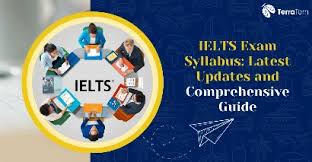
Introduction
If you’re planning to study abroad in an English-speaking country like the US, UK, Canada, Australia, or New Zealand, there’s one thing you’ll need to prove: your English proficiency. One of the best ways to do this is by taking the IELTS (International English Language Testing System) exam.
The IELTS 2025 exam is a crucial step for any student looking to pursue higher education in these countries. It’s widely accepted by universities, employers, and immigration authorities as proof of your ability to understand and communicate in English.
In this comprehensive guide, we’ll explore the details of the IELTS 2025 exam—how it works, what you can expect, and most importantly, how you can prepare for it. Whether you're just starting your preparation or looking for tips to boost your score, this blog will walk you through everything you need to know to succeed in the exam and take the next step toward your study abroad goals.
What is IELTS?
The IELTS exam is an English proficiency test that assesses your ability in four key areas: listening, reading, writing, and speaking. It’s the most widely recognized and accepted test for people who want to study, work, or migrate to English-speaking countries.
There are two types of IELTS exams:
IELTS Academic – This test is for students who want to pursue higher education at universities or colleges in English-speaking countries.
IELTS General Training – This test is for those who need English proficiency for work, migration, or training programs.
Why is IELTS Important for Study Abroad?
For students aiming to study abroad, especially in English-speaking countries, IELTS is more than just an exam; it’s often the first step in the journey. Here’s why:
University Admissions: Most universities around the world require a minimum IELTS score for admission into undergraduate or postgraduate programs.
Visa Applications: If you’re applying for a student visa to study abroad, the visa process often requires you to show proof of English proficiency, which can be done through your IELTS score.
Career Opportunities: A good IELTS score can also help you stand out when applying for jobs or internships in English-speaking countries.
Having a good IELTS score not only improves your chances of getting accepted into your dream university but also helps you adjust to life in an English-speaking environment.
IELTS 2025 Test Format
Understanding the format of the IELTS exam is key to preparing for it. The exam is divided into four sections: Listening, Reading, Writing, and Speaking. Here’s a breakdown of each section:
1. Listening (30 minutes)
The Listening section of the IELTS exam involves listening to four recordings of native English speakers. You will hear conversations, monologues, and discussions on various topics. After listening, you will need to answer 40 questions that test your ability to understand specific details, main ideas, opinions, and attitudes in the recordings.
Tip: Practice listening to different accents (British, American, Australian) to prepare for the variety of speakers you’ll encounter.
2. Reading (60 minutes)
The Reading section consists of three reading passages with 40 questions in total. The passages range in difficulty, from basic texts to more complex academic or general topics. This section tests your ability to skimm and scan texts, understand the main ideas, and recognize specific information.
Academic IELTS: The texts are usually more complex and academic.
General Training IELTS: The texts are more practical and everyday-related, focusing on social and workplace topics.
3. Writing (60 minutes)
The Writing section consists of two tasks:
Task 1: You’ll be asked to describe, summarize, or explain information presented in graphs, charts, or diagrams.
Task 2: You’ll be asked to write an essay in response to a question, which may involve discussing an argument, providing an opinion, or offering solutions.
Tip: Practice writing essays and reports regularly to improve your writing fluency and structure.
4. Speaking (11–14 minutes)
The Speaking section is a face-to-face interview with an IELTS examiner. It’s divided into three parts:
Part 1: The examiner will ask you general questions about familiar topics (like hobbies, family, work).
Part 2: You’ll be given a topic card and asked to speak about the topic for 1–2 minutes.
Part 3: This part involves a more detailed discussion on the topic from Part 2, with questions that require critical thinking and expressing opinions.
How to Prepare for IELTS 2025?
Preparing for the IELTS 2025 exam can be challenging, but with the right plan, you can achieve your target score. Here are some preparation tips to help you get started:
1. Understand the Test Format
Before you dive into preparation, take time to familiarize yourself with the test format. Knowing what to expect in each section will help you stay calm and organized on test day.
2. Take Practice Tests
Taking practice tests is one of the best ways to assess your current level and identify areas that need improvement. Try to simulate actual test conditions by timing yourself and following the test format. Regular practice will help you improve your time management and test-taking skills.
3. Improve Your Vocabulary
Building a strong vocabulary is crucial for scoring well in the IELTS exam. Read newspapers, books, and academic articles in English. Write down new words and phrases and practice using them in sentences.
4. Work on Speaking and Writing
Speaking and writing are often the most challenging sections for many students. To improve your speaking skills, try to practice conversations with friends, join speaking clubs, or use language exchange apps. For writing, focus on organizing your ideas clearly and practice writing essays under timed conditions.
5. Join IELTS Preparation Classes or Use Online Resources
If you feel you need extra help, joining IELTS preparation classes can be a great way to get structured guidance. Alternatively, online resources such as sample papers, YouTube videos, and websites can also be helpful.
6. Use SuGanta.com for Personal Coaching
If you prefer personalized guidance, SuGanta.com offers verified tutors who specialize in IELTS preparation. Whether it’s writing techniques, speaking practice, or listening skills, SuGanta.com connects you with experienced tutors who can help you reach your target score.
Tips for Success in IELTS
Stay Calm and Confident
Relax during the exam. If you feel nervous, take a deep breath and refocus. Remember, you’ve prepared well, and you can do this!
Manage Your Time
Keep track of time during the exam. Don’t spend too much time on any one question. If you’re stuck, move on and come back later.
Use Your Strengths
Focus on your strengths in the test. If you’re strong in writing, make sure you excel in that section to balance out any weaknesses.
Practice with Real Materials
Try using actual IELTS practice tests and sample papers to simulate exam conditions.
Conclusion
Taking the IELTS 2025 exam is an essential step for students wishing to study abroad in an English-speaking country. With the right preparation, understanding the test format, and using helpful resources like SuGanta.com, you can boost your chances of achieving a great score and opening doors to your dream education abroad.
Whether you’re looking for help with writing essays, speaking practice, or listening skills, SuGanta.com offers personalized coaching to ensure that you feel confident and fully prepared for the exam.





